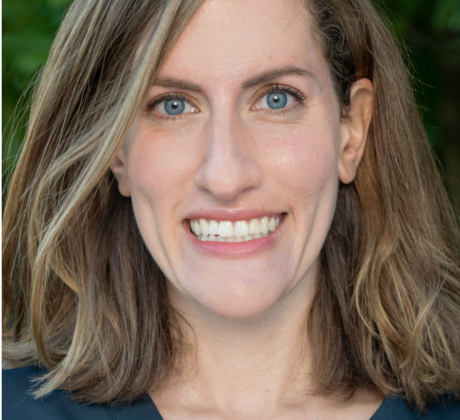Stephanie Ostroff is a speech-language pathologist and journalist. She enjoys blending knowledge from both fields to shine a light on innovators and changemakers in health care.


Rupal O’Quinn, MD, FACC, MHCI '23 fosters med-tech implementation by thinking differently
Since its launch in 2015, the Apple Watch has become a fixture on the wrists of over 100 million people worldwide. More than a timepiece, the device has numerous data-tracking capabilities that can inform cardiovascular care. Although Apple has published scientific papers about its smartwatch, there was never a single, clinician-validated source where cardiologists and patients could turn for easy-to-follow guidance on using it to monitor heart health.
Now, there is. The “Leveraging Apple Watch for Cardiovascular Care” tool was developed by a work group within the American College of Cardiology’s (ACC) Innovation Program led by Penn Medicine cardio-oncologist Rupal O’Quinn.
O’Quinn is Director of Penn Presbyterian Medical Center’s Cardio-Oncology program and Associate Program Director of Penn’s Cardiovascular Disease Fellowship. She had always been interested in bridging the clinical and business realities of health care. The skillset she developed in Penn's Master of Health Care Innovation (MHCI), she says, positioned her as an expert.
“The way I think about things comes from classes I took in the MHCI degree,” says O’Quinn. When colleagues admire her creative approach to problem-solving, she tells them, “Honestly, this is how everybody who did this program would be thinking.”
Figure out what your scope is, and don’t go outside of that scope.
Apple sought support from the ACC to translate the capacity of the Apple Watch to clinicians and patients managing cardiovascular health. Despite the ubiquity of the smartwatch, misinformation about its heart-related features had led to confusion.
In May 2025 O’Quinn and her work group published “Leveraging Apple Watch for Cardiovascular Care.” The 15-page document addresses using Apple Watch to monitor heart health and dispels common myths.
The tool includes an implementation checklist and workflow for clinicians, accurate information about arrhythmia monitoring, and a guide on best practices for using the smartwatch to track heart data (including when not to use it). For patients, it offers directions on how to use Apple Watch features such as Irregular Rhythm Notification and electrocardiogram (ECG) recording.
O’Quinn’s team developed the tool in about a year—a quick turnaround for a project of this scale. “We did so much more in a shorter period of time than most groups,” says O’Quinn. “That really is attributed to what I learned in the MHCI: not to overextend. Figure out what your scope is, and don’t go outside of that scope.”
To chair the work group, O’Quinn needed to bridge clinical and entrepreneurial perspectives. She’d done just that in 2023, as a recent MHCI graduate, when she joined the ACC’s Innovation Program to support a Swedish medical device company as they rolled out a tool to detect blockages at the bedside. She advised the company on improving workflows and incentivizing reimbursement, and considered problems from new angles.
“The manager of the group and other people were super impressed with the way I was thinking," says O’Quinn. “They asked me to chair the Apple work group.”
She anticipates further collaboration with Apple on new projects based on their positive feedback and was invited to attend the company’s Health Research Summit in October 2025.
O’Quinn wants to see more cardiologists address clinical challenges with design thinking. She has made it her mission to share the innovation principles she’s learned with the next generation of cardiologists. At Penn Presbyterian Medical Center, she is helping to launch a clinical track within the cardiology fellowship. It pairs an opportunity to use innovation and quality improvement to solve patient care challenges.
“We hope that the clinical track fellows will have time during their three-year fellowship to really do something about problems they identify in the system,” she says. “We envision them finding the root cause and potentially piloting various solutions to figure out what works best, so that we can actually implement what they recommend.”
At the same time, O’Quinn will be completing a fellowship of her own: She was selected as a 2025 Penn Health-Tech Clinical Fellow. The program fosters collaboration among entrepreneurs, academics, and clinicians, and in her role, she will contribute to the development of medical devices at Penn.
Reflecting on her successful partnership with Apple and the med-tech innovation she’s fostering at Penn, O’Quinn says, “I can tell you that what I’ve done is because of the MHCI degree.”

